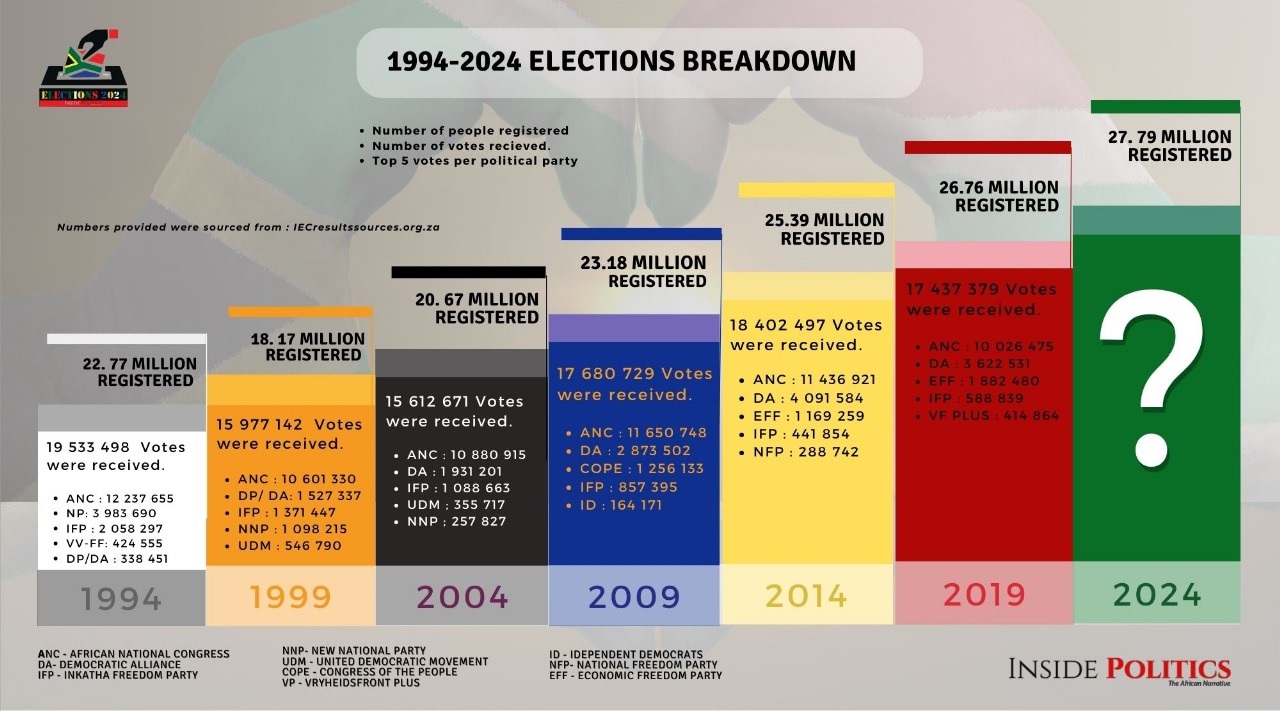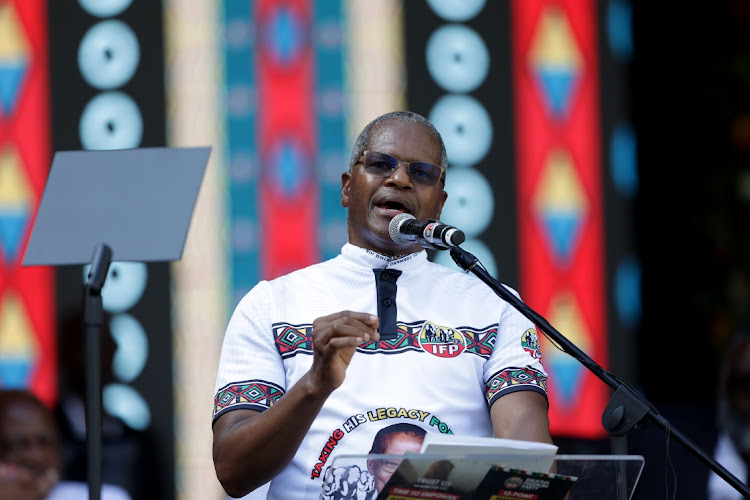By Inside Politics Special Correspondent
The Inkatha Freedom Party (IFP) wrapped up its campaign for the 29 May national and provincial elections with a show of strength on Sunday at its final rally at Umhlathuze with an eye on the premiership of KwaZulu-Natal after a 20-year absence.
Party president Velenkosini Hlabisa addressed the rally along with the party’s provincial chairperson, Thami Ntuli, the mayor of the King Cetshwayo District Municipality and the provincial chairperson of the South African Local Government Association.
Ntuli, the former mayor of Nkandla, is the IFP’s premier candidate after emerging from a tussle with Hlabisa, who had wanted to remain in the provincial legislature as the leader of the official opposition in the province.
The IFP in KZN – South Africa’s second largest province with 12.8 million residents and 5.7 million registered voters – hopes to capitalise on recent voting trends and take it back from the ANC. It governed the province 1994 and 2004, when it lost out to an ANC-led coalition.
The ANC consolidated its control of the province in 2009, when it took 63.97% of the vote, improving on this in 2014 when it secured 65.31%.
During this period of growth, the IFP vote was reduced to just over 10% with only four seats in the 41-seat provincial legislature.
However, more recently the IFP has made something of a comeback increasing its vote share to 14.5% in 2019, as opposed to the ANC’s 55.47%, which saw it lose ground in the province.

This trend continued in the local government elections in November 2021, when the IFP took 26.42% of the vote across the province regaining control of several hung municipalities through an agreement with the Democratic Alliance (DA).
Since then, the DA and IFP have won more than a dozen wards off the ANC, six of which will have by-elections on 19 June, weeks after the national and provincial poll.
While the DA and the IFP have not contested against each other at local government level, the DA is fielding Umngeni Local Municipality mayor Christopher Pappas as its premier candidate.
Pappas will take on the ANC chairperson, Siboniso Duma, the current economic development MEC, in the battle for the premier’s position.
The post will also be contested by the Economic Freedom Fighters secretary general, Marshall Dlamini, who was named as premier candidate by party leader Julius Malema at its final rally in Seshego at the weekend.
The Economic Freedom Fighters (EFF), is the fourth largest party in the province, having taken 9.6% of the vote in the province in 2019.
It has four seats in the legislature and has been part of a governing coalition with the ANC in eThekwini – where the governing party got below 50% for the first time – since 2021.
The EFF has not fared well in recent by-elections in the province and recently lost votes – along with the ANC – to the new entrant into the political contest, Jacob Zuma’s uMkhonto we Sizwe Party, in by-elections in uPhongolo and Vryheid.
The new party took more than 20% of the vote in each of the two by-elections and will be the key party to watch in the coming election.
Its premier candidate, former KwaZulu-Natal director general Nhlanhla Ngidi, was removed by the party, and it is yet to indicate who will fill the post, should it end up in control of the province.
Its emergence has seen many Zuma supporters leave the ANC in Durban, Pietermaritzburg and Newcastle and the rural towns around the province and this is expected to translate into votes.
The latest tracking poll by the Social Research Foundation set the party’s support in KwaZulu-Natal at more than 30% in both a 60% and a 66% turnout, ahead of the governing party, the DA, the IFP and the EFF respectively.
Much is at stake for the four major parties with the newcomers trying to break into the political scene in KwaZulu-Natal.
With a contribution of 16% to Gross Domestic Product (GDP), KwaZulu-Natal is one of South Africa’s economic powerhouses, second after Gauteng, and receives an annual budget of R150 billion from the National Treasury.
Mining, agriculture, manufacturing, and tourism are the biggest creators of employment in the province with Richards Bay Minerals, KwaZulu-Natal’s largest employer, adding R8 billion a year to the economy in the form of royalties, wages, and taxes.
According to Statistics SA’s quarterly labour force report released in May, the unemployment level in KwaZulu-Natal stands at 29.9%, below the national average of 32.9%.
The province also made amongst the most significant employment gains in the country during the first quarter of 2024, with 62 000 new jobs recorded during that period.
KwaZulu-Natal has consistently gained jobs since the second quarter of 2023, reversing some of the economic damage sustained during Covid-19, the 2021 riots and the devastating floods of April 2022.
Ethekwini was among the worst hit by the riots – which cost the province R20 billion – and the flooding. Infrastructure damage sustained as a result has added to the service delivery failures by the province’s only Metro council.
Water provision across the city continues to be disrupted. This, and allegations of corruption in the awarding of water tanker contracts – one of which is a R90 million deal that is now the subject of a High Court battle between eThekwini and contractors – has added to the council’s woes.
Electricity infrastructure, roads and bridges damaged in 2021 and 2022 in eThekwini have still to be fully repaired at a cost of R17 billion.
Durban Solid Waste – the refuse removal division – has been hit by a series of strikes by staff and contractors.
Former mayor Zandile Gumede and 21 others are currently on trial for defrauding the department of R320 million allocated for refuse removal in 2016, a loss from which it appears to have never recovered.
Last year the provincial cooperative governance ministry placed the city under administration and appointed a three-person team – headed by former director general in the presidency Cassius Lubisi – to oversee a turnaround in eThekwini.
However, they met fierce resistance from the ANC’s eThekwini region – over which Gumede still commands massive influence – and were forced to leave after six months without having made any progress.
Service delivery collapse is not limited to eThekwini.
Eight of the 61 municipalities across the province have been placed under administration by Cogta since 2023 due to governance failures, financial collapse or a failure to elect councils.
A total of 23 of the councils are facing either high or medium risk of dysfunction, according to Cogta, which last week placed the IFP-controlled Zululand District Municipality under administration.
Cogta MEC Bongiwe Sithole-Moloi cited service delivery failure, the disappearance of R30m in funds and alleged misconduct by mayor Thulasizwe Buthelezi as the reasons for the provincial cabinet deciding to place the council under administration.
It is set to spark a fierce court battle with Zululand, one of the IFP’s strongholds in the heavily contested province.
The opposition parties are not the only ones with their eyes fixed firmly on KwaZulu-Natal.
The ANC is acutely aware that it could lose the province and has poured resources into the campaign in KwaZulu-Natal – in eThekwini in particular – since last year, boosting the regional and provincial elections teams with a head office team that will only leave when the counting is done.
President Cyril Ramaphosa, former president Thabo Mbeki, former deputy president Kgalema Motlanthe and secretary general Fikile Mbalula all took part in the intensive campaigning in KwaZulu in the past three weeks.
Ramaphosa returned to the province – which he described as a “deep voting pool” for the ANC during his last visit – several times during May, a clear response by the governing party to the threats to its narrow majority.
The party hopes to not only halt its electoral slide in KwaZulu-Natal, but to boost its national figures by focusing on the voter districts where it has the largest number of registered voters to make sure that they get to the polling stations on 29 May.
It will be anyone’s guess what will sway voter’s mind on the day.
INSIDE POLITICS

